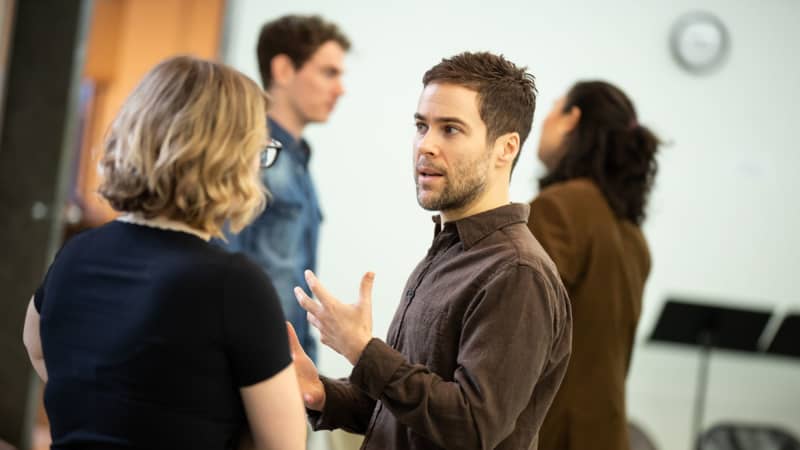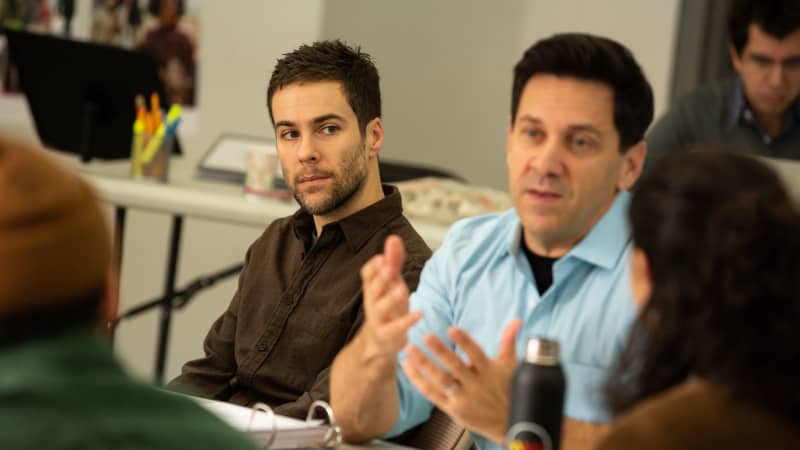Darling Grenadine:
An Interview with Composer and Lyricist Daniel Zaitchik
Posted on: February 11, 2020
Education Dramaturg Ted Sod spoke with writer Daniel Zaitchik about his work on Darling Grenadine.
Ted Sod: Where were you born and educated? Did you have any teachers who had a profound influence on your decision to write for the musical theatre?
Daniel Zaitchik: I was born and raised outside Boston. Music was a big part of my childhood. My family would listen to everything from opera to gospel. I feel lucky to have been exposed to a wide range of music from a young age. I think it must be why I never think much about genre or needing to fit into a musical box.
I started writing wordless songs at the piano when I was a little kid. They had titles like “The Magic Ferris Wheel” and “The Gnomes’ Party.” So while I didn’t know I’d end up writing for theatre, it seems storytelling was a big part of music for me from the beginning. My parents also introduced me to poets like e e cummings and Wallace Stevens. Before I started writing my own lyrics, I would set poems to music.
As a teenager, I was drawn to singer-songwriters like Billy Joel, Leonard Cohen, Simon & Garfunkel, Nina Simone, and Tori Amos—storytellers who painted vivid scenes with their words and melodies. So they were sort of my teachers living inside cassette tapes and CDs.
I studied piano pre-college at The New England Conservatory. Although I loved the music I was being introduced to—especially French impressionists like Debussy and Ravel—I never felt comfortable in that world and was nowhere near as technically skilled as the other students. Theatre was where I felt more at home. I had an influential high school drama teacher who trusted us to handle complex material and encouraged us to write our own stuff. So I became passionate about theatre in high school and ended up studying acting at Boston University. During my time there, I continued to play and sing, and I developed my first musical.
Although I never studied writing musical theatre specifically, being an actor and a singer-songwriter naturally led to that kind of storytelling.
TS: What inspired you to write and compose Darling Grenadine? What do you feel the musical is about?
DZ: Darling Grenadine came about from an instinct to write something personal—something about the kinds of people I know and the world in which we work together: the world of music and theatre. When looking for subjects to write about, I’m often drawn to long-ago time periods, myths, and mysteries. But with this project, I instead looked around at the people and patterns closest to me—the things happening in the rooms I’m in, the relationships I observe, and pieces of myself.
There’s a long tradition in cinema and music-theatre of telling the backstage stories and personal journeys of artists. I wanted to play around with the tropes of that tradition—embrace them, challenge them. I started by taking stock characters we recognize from old tuners—the up-and-coming Actress, the charismatic Composer, the witty Bartender—and attempted to let them be real, substantial people. The people I know.
I was looking for the humor and fizz of a starry-eyed MGM classic that simultaneously examined contemporary people struggling with serious situations we can relate to. The inherent escapism of the romantic musical comedy form seemed like a fitting vessel for the themes I was particularly interested in exploring: denial and charm.
Life is a constant seesaw of light and dark, hope and despair. I wanted to find that balance in this musical and explore the complexities of being human within a story that still allowed for laughter and joy.
TS: How did you decide what the score for Darling Grenadine would sound like?
DZ: When I write, I tend to just sit at the piano and see what happens. This was especially helpful for this piece because Harry, our main character, is also a piano player and composer. So I think the sound of the show just started to reveal itself as I went along and got closer to the characters.
I found that although the show is set in present-day Manhattan, I wanted to infuse some of the songs with a bit of an old-fashioned flair that matched Harry’s charisma and the kind of throw-back “backstage” story we’re telling.
There have ended up being three categories of music in the show: 1) Non-diegetic music that the characters sing in the context of the story 2) Diagetic music that the characters perform at a piano bar where much of the show takes place, and 3) Diagetic music in Paradise—the Broadway musical (within the musical) that the character Louise is performing in. It’s fun to play with blurring these lines.
Also, because I was examining themes of denial and honesty in the script, I wanted to explore these in the music, too—can some music sound more “true”? In this piece, I’m interested in music that feels raw and authentic as well as music that can charm or manipulate.

TS: What was the most challenging part of writing all the elements of this musical play? What part of your process was the most fun?
DZ: I really do enjoy it all—the music, lyrics, and book. But the book is the most challenging part for me because it requires continual refinement. It’s also the element people will have the most opinions about. So it’s about letting all those opinions in—because some of them are incredibly valuable—while also staying true to your original intentions.
The most fun part of the process is when other people are in the room. There’s only so much I can do by myself before needing to hear the words and music out loud. In my own bubble, I become too close to the material, and at a certain point my brain becomes mush, and I can’t see what I have.
TS: Please describe what the development process on this musical was like? What do you look for from your collaborators when working on a new musical work for the stage?
DZ: We did the first staged reading in Los Angeles through the Foundation for New American Musicals. It was further developed at The Eugene O’Neill Theater Center, followed by a developmental production at Goodspeed Musicals. Next, we took it to NAMT’s Festival of New Works, after which I started working on it with the Roundabout team. There was also a production at the Marriott Theatre outside Chicago.
Developing a musical can be tricky because there are so many elements involved and so many people in the room. Sometimes it can feel like there are too many cooks in the kitchen. But especially as a solo writer, after so much solitary time, I’m eager for collaboration and guidance. So you just need to make sure you surround yourself with smart, sensitive collaborators you trust.
I first worked on the show with director Kristin Hanggi, who was very helpful in helping me figure out what I was writing. Now Michael Berresse and Jill Rafson continue to be a tremendous help. We toss around ideas, try things out, throw them away…it’s a puzzle. Working with a new director on a piece that you’ve been developing for a while can be eye-opening. Michael doesn’t have any attachment to past versions of the show, so he can just see it for what it is now. This is good for me—it allows me to see what I may be holding onto from earlier drafts that may no longer serve the piece.

Daniel Zaitchik with Michael Berresse
© Jeremy DanielIn terms of music direction, I look for someone who innately understands what I’m going for and also brings new ideas to the table. I’ve been working with David Gardos as MD since the Goodspeed production. Matt Moisey has been my orchestrator since then as well. With orchestration in a small space like the Underground, it’s about making the most out of the minimalist set-up we’ll have, which is only three musicians. It’s fun to see a song change and blossom when it’s orchestrated. In this show, I think that’s particularly striking with what Matt has done with the songs that take place in the musical within the musical.
TS: Who or what inspires you as an artist?
DZ: I’m inspired by nature. I'm inspired by the emotions and challenges most of us experience, no matter our backgrounds—grief, resilience, love. I’m inspired by all the ineffable mysteries of the universe and the heart—you know, the light and fluffy simple stuff! I’m also so inspired by humor and absurdity. There’s nothing better than laughing till I’m crying and gasping for air.
TS: What advice would you give to a young person who wants to write for the musical theatre?
DZ: Don’t wait for anyone to do anything for you. Do it yourself. Find collaborators. Write stuff for your friends. Write about what you love, not what you think anyone else wants. Move your furniture and rehearse in your living room. Share unfinished work in casual environments.
What you’re working on will never be as important to anyone else as it is to you. People will flake. Emails will go unanswered. You won’t get that grant you applied for. Still, you have to write the emails and apply for the grants.
But do it for yourself, in order to become more confident and take yourself seriously. Surround yourself with people you admire, people who are kind and fun. Don’t lose the spirit you had when you were a kid and you first started making things. It’s not a race. Be patient.
TS: What other projects are you currently working on?
DZ: This year I’ve been recording a new singer-songwriter album called Natural History, which will be released in early 2020. It’s a collection of songs inspired by the natural world. I’m also working on an expansion of my one-act musical The Costume, an animation project, and a new music-theatre piece.
